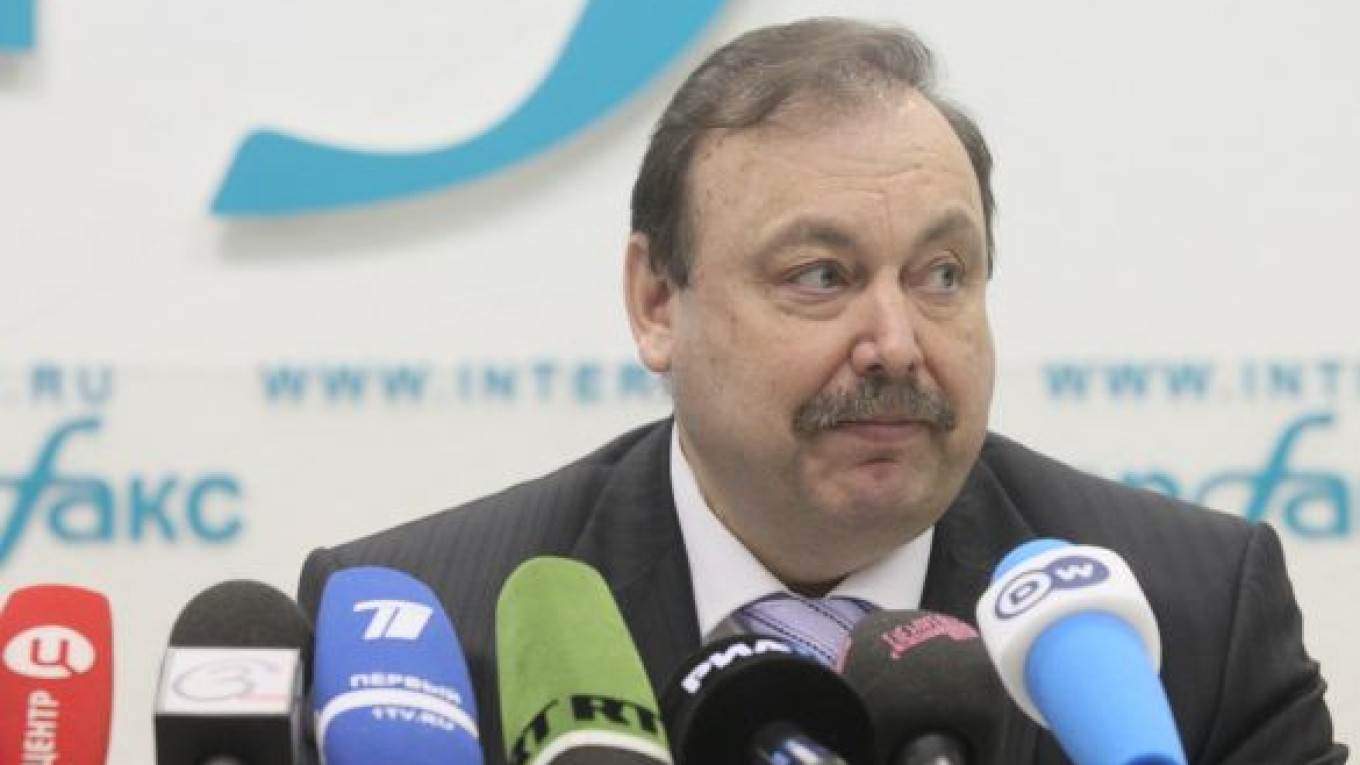Some of Russia's most prominent nonsystemic opposition leaders founded the Social Democrats of Russia party on Sunday, marking a first step toward the possible consolidation of the country's marginal social democratic factions.
The announcement comes amid a proliferation of opposition parties, among them former Moscow mayoral candidate Alexei Navalny's People's Alliance, in the two years since the Kremlin moved to ease registration requirements for political parties.
Gennady Gudkov, a former leading member of A Just Russia, was voted head of the Social Democrats of Russia by the new party's supporters. Gudkov's son, State Duma Deputy Dmitry Gudkov, and Duma deputy Ilya Ponomaryov — who along with the elder Gudkov were among the main leaders of the anti-Kremlin street protests in late 2011 and 2012 — were appointed to the party's political council.
The Gudkovs, some of President Vladimir Putin's most outspoken critics, are re-emerging on Russia's political scene after having been ousted from A Just Russia in March on accusations of being "harmful to the party." Their highly visible participation in the street protest movement had rankled many members of A Just Russia, which has a social democratic policy platform but often follows Kremlin positions when voting in the Duma.
The Social Democrats of Russia party announced that it was ready to cooperate with the liberal Yabloko party, the Green Alliance — People's Party, and People's Alliance, but there remain many questions about the new party's structure.
"Although negotiations currently are being held among four or five parties — some registered and others that are still working on their registration — as well as among a number of politicians and civil society activists, no decisions have been made at this point," Dmitry Gudkov wrote in his blog.
Izvestia had previously reported that the new party would merge with Oleg Mitvol's and billionaire Gleb Fetisov's Green Alliance — People's Party, a report that Dmitry Gudkov denied.
Speculation about a potential merger had emerged in light of Gleb Fetisov's $1.9 billion fortune, which likely would secure funding for the new party. Funding is a perennial problem for Russia's opposition parties, as many potential sponsors consider it dangerous for their business interests to give money to anti-Putin forces.
"I do not see a problem if major businessmen who are not involved in crime finance our party,"? Gennady Gudkov said, Itar-Tass reported. "The more money we have, the quicker we will rise to power."
But billionaire Fetisov has yet to commit, either politically or financially, to Gudkov's new party.
"We [the Green Alliance — People's Party] can sympathize with this new social democratic party, and we absolutely want to befriend it," Fetisov told reporters on Sunday, Itar-Tass reported. "But there is no clarity yet."
Despite the uncertainty surrounding the new party's structure, Gennady Gudkov openly advocated the amalgamation of leftist parties.
"Establishing the Social Democrats of Russia party carries the historical mission to unite responsible leftist factions and strive for long-term cooperation with other leftist parties, trade unions and civil society organizations," the elder Gudkov said in a statement. "The future success of social democratic ideals and values comes through unity."
If Russia's marginal social democratic parties were to fuse into the Social Democrats of Russia, the new party would present itself as an alternative to A Just Russia, which has grown to "serve the Kremlin," according to Gennady Gudkov.
Alexei Mukhin, director of the Moscow-based Center for Political Information, said it was too early to say what kind of success the Social Democrats of Russia party would have.
"Since the new legislation [simplifying party registration] was adopted, political parties have been growing like mushrooms," Mukhin said. "Some of these mushrooms can be good to cook meals, but not all of them are."
The party still needs to register officially with the Justice Ministry and secure funding before it can engage in organized political activity.
In April 2012, the Duma passed a law that reduced the membership requirement for registering a political party to 500 people, down from 40,000, and abolished the collection of voter signatures as a condition to participate in elections.
In 1999, 169 parties participated in the Duma elections, but by 2005 only seven parties remained after the Kremlin tightened party registration regulations. That number has once again ballooned after the rules were eased last year, with 77 political parties now registered in Russia.
Contact the author at [email protected]
A Message from The Moscow Times:
Dear readers,
We are facing unprecedented challenges. Russia's Prosecutor General's Office has designated The Moscow Times as an "undesirable" organization, criminalizing our work and putting our staff at risk of prosecution. This follows our earlier unjust labeling as a "foreign agent."
These actions are direct attempts to silence independent journalism in Russia. The authorities claim our work "discredits the decisions of the Russian leadership." We see things differently: we strive to provide accurate, unbiased reporting on Russia.
We, the journalists of The Moscow Times, refuse to be silenced. But to continue our work, we need your help.
Your support, no matter how small, makes a world of difference. If you can, please support us monthly starting from just $2. It's quick to set up, and every contribution makes a significant impact.
By supporting The Moscow Times, you're defending open, independent journalism in the face of repression. Thank you for standing with us.
Remind me later.


